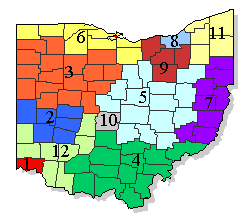 When I vacation in other states, people ask me where I’m from. When I say “Columbus”, I usually have to add “Ohio”. I have learned that very few people travel to Ohio for vacation. Some people do travel here for business and personal trips. Whether here for a business trip, a personal trip, or an improbable vacation, if a driver with a license issued by another state gets a DUI/OVI in Ohio, that person faces consequences in Ohio and may face consequences in the state which issued the driver’s license.
When I vacation in other states, people ask me where I’m from. When I say “Columbus”, I usually have to add “Ohio”. I have learned that very few people travel to Ohio for vacation. Some people do travel here for business and personal trips. Whether here for a business trip, a personal trip, or an improbable vacation, if a driver with a license issued by another state gets a DUI/OVI in Ohio, that person faces consequences in Ohio and may face consequences in the state which issued the driver’s license.
Articles Tagged with Ohio DUI Laws
Nate Hobbs’ Case and Detentions for DUI / OVI investigations
 Although it is starting to look like it, this is not a blog about NFL players charged with DUI (called ‘OVI’ in Ohio). Recent articles discussed the cases of Henry Ruggs III and Geno Smith because those cases illustrated legal concepts related to DUI/OVI. The last article, about Geno Smith’s arrest, addressed what evidence indicates a driver may be under the influence before a traffic stop. In some DUI/OVI cases, traffic stops are not an issue, such as when the driver is in an accident or found passed-out behind the wheel. The legal concept at issue in those cases is when the driver is ‘seized’ and whether the seizure is legal. The case of Las Vegas Raiders cornerback Nate Hobbs illustrates that concept.
Although it is starting to look like it, this is not a blog about NFL players charged with DUI (called ‘OVI’ in Ohio). Recent articles discussed the cases of Henry Ruggs III and Geno Smith because those cases illustrated legal concepts related to DUI/OVI. The last article, about Geno Smith’s arrest, addressed what evidence indicates a driver may be under the influence before a traffic stop. In some DUI/OVI cases, traffic stops are not an issue, such as when the driver is in an accident or found passed-out behind the wheel. The legal concept at issue in those cases is when the driver is ‘seized’ and whether the seizure is legal. The case of Las Vegas Raiders cornerback Nate Hobbs illustrates that concept.
Geno Smith’s Case and Pre-Stop Evidence of DUI / OVI
 I heard a report that Geno Smith, quarterback for the Seattle Seahawks, was stopped for speeding and arrested on suspicion of DUI (called ‘OVI’ in Ohio). My first thought was, “speeding doesn’t sound like evidence of DUI”. It turns out Smith was allegedly going 96 mph in a 60 mph zone and driving erratically across several lanes of traffic (according to ESPN). That sounds more like evidence of DUI. Geno Smith’s case prompts the question: “what evidence, before a stop, indicates a driver may be under the influence?”
I heard a report that Geno Smith, quarterback for the Seattle Seahawks, was stopped for speeding and arrested on suspicion of DUI (called ‘OVI’ in Ohio). My first thought was, “speeding doesn’t sound like evidence of DUI”. It turns out Smith was allegedly going 96 mph in a 60 mph zone and driving erratically across several lanes of traffic (according to ESPN). That sounds more like evidence of DUI. Geno Smith’s case prompts the question: “what evidence, before a stop, indicates a driver may be under the influence?”
Brain Imaging to Detect Marijuana Intoxication
 Determining whether a driver is under the influence of marijuana is challenging. The standardized field sobriety tests used to predict alcohol levels are ineffective for marijuana intoxication. Levels of THC and its metabolites in blood and urine are not closely correlated with marijuana intoxication. So, how can law enforcement determine when THC is impairing a person’s ability to drive? Researchers are working on brain imaging technology which may offer a more reliable method for identifying impairment from marijuana intoxication.
Determining whether a driver is under the influence of marijuana is challenging. The standardized field sobriety tests used to predict alcohol levels are ineffective for marijuana intoxication. Levels of THC and its metabolites in blood and urine are not closely correlated with marijuana intoxication. So, how can law enforcement determine when THC is impairing a person’s ability to drive? Researchers are working on brain imaging technology which may offer a more reliable method for identifying impairment from marijuana intoxication.
Does Ohio’s Drugged Driving ‘Per Se’ Law Unconstitutionally Punish Status?
 When a person uses marijuana, the high from the THC last for about two hours, but the THC metabolites are detectable in the person’s urine for up to five weeks. Suppose a person smokes marijuana and a week later is pulled over and investigated for DUI (called ‘OVI’ in Ohio). If that person submits a urine sample and the urine test shows a prohibited level of marijuana metabolite, that person will be prosecuted for OVI because it is ‘per se’ illegal to operate a vehicle with a prohibited concentration of marijuana metabolites, even if the person’s driving is not impaired. Challenges to this ‘per se’ OVI law have been unsuccessful in Ohio courts. A recent case from the Ohio Supreme Court suggests the Court may be inclined to evaluate the constitutionality of the OVI ‘per se’ law for drugs.
When a person uses marijuana, the high from the THC last for about two hours, but the THC metabolites are detectable in the person’s urine for up to five weeks. Suppose a person smokes marijuana and a week later is pulled over and investigated for DUI (called ‘OVI’ in Ohio). If that person submits a urine sample and the urine test shows a prohibited level of marijuana metabolite, that person will be prosecuted for OVI because it is ‘per se’ illegal to operate a vehicle with a prohibited concentration of marijuana metabolites, even if the person’s driving is not impaired. Challenges to this ‘per se’ OVI law have been unsuccessful in Ohio courts. A recent case from the Ohio Supreme Court suggests the Court may be inclined to evaluate the constitutionality of the OVI ‘per se’ law for drugs.
A Tale of Two Cities: Destroyed Evidence in Ohio DUI / OVI Cases
 In a DUI case (called ‘OVI’ in Ohio), what happens when evidence is destroyed because a prosecutor does not timely respond to a specific request for that evidence? It depends on the jurisdiction. In ten of Ohio’s 12 appellate districts, the case would likely be dismissed. In the other two Ohio appellate districts, there would likely be no sanction. Two appellate cases from two Ohio cities illustrate the outcome depends, in large part, on where the case is heard.
In a DUI case (called ‘OVI’ in Ohio), what happens when evidence is destroyed because a prosecutor does not timely respond to a specific request for that evidence? It depends on the jurisdiction. In ten of Ohio’s 12 appellate districts, the case would likely be dismissed. In the other two Ohio appellate districts, there would likely be no sanction. Two appellate cases from two Ohio cities illustrate the outcome depends, in large part, on where the case is heard.
Should Ohio Have Police Draw Blood For DUI / OVI Cases?
 Police officers in Georgia are being trained to draw blood from drivers suspected of DUI (called ‘OVI’ in Ohio). Typically, a person arrested for OVI in Ohio is taken to a police station for a breath test or urine test. Occasionally, an OVI suspect is taken to a hospital for a blood test. In Georgia, DUI suspects will now have their blood drawn by police officers. Could we soon have police officers drawing blood from OVI suspects in Ohio?
Police officers in Georgia are being trained to draw blood from drivers suspected of DUI (called ‘OVI’ in Ohio). Typically, a person arrested for OVI in Ohio is taken to a police station for a breath test or urine test. Occasionally, an OVI suspect is taken to a hospital for a blood test. In Georgia, DUI suspects will now have their blood drawn by police officers. Could we soon have police officers drawing blood from OVI suspects in Ohio?
Driving Under the Influence of Dehydration
 Ohio may need a new acronym for impaired driving. Our state has used various drunk driving abbreviations in the past. There was ‘DUI’ for Driving Under the Influence and then ‘OMVI’ for Operating a Motor Vehicle Intoxicated. Now that Ohio law does not require the vehicle to be motorized, we use ‘OVI’ for Operating a Vehicle under the Influence. In the future, the acronym may be ‘OVD’ for Operating a Vehicle Dehydrated. A study published in Physiology & Behavior suggests dehydrated driving is similar to intoxicated driving.
Ohio may need a new acronym for impaired driving. Our state has used various drunk driving abbreviations in the past. There was ‘DUI’ for Driving Under the Influence and then ‘OMVI’ for Operating a Motor Vehicle Intoxicated. Now that Ohio law does not require the vehicle to be motorized, we use ‘OVI’ for Operating a Vehicle under the Influence. In the future, the acronym may be ‘OVD’ for Operating a Vehicle Dehydrated. A study published in Physiology & Behavior suggests dehydrated driving is similar to intoxicated driving.
Ironic Appeal In Traffic Camera Case
 Some municipalities in Ohio have used unfair procedures for enforcing traffic violations detected by cameras. The Ohio General Assembly addressed that unfairness by creating a new process for traffic camera violations. Not all municipalities are following the new rules. Recently, a municipal court judge found the Village of Brice did not comply with the newly mandated rules. In an ironic twist, Brice complained to the Court of Appeals that the Village was denied due process in the municipal court proceeding.
Some municipalities in Ohio have used unfair procedures for enforcing traffic violations detected by cameras. The Ohio General Assembly addressed that unfairness by creating a new process for traffic camera violations. Not all municipalities are following the new rules. Recently, a municipal court judge found the Village of Brice did not comply with the newly mandated rules. In an ironic twist, Brice complained to the Court of Appeals that the Village was denied due process in the municipal court proceeding.
Ohio Supreme Court Upholds OVI/DUI Stop Based on Shouted Tip
 There are many different ways somebody can find themselves as the subject of an OVI/DUI investigation. The most common is when an officer witnesses a driver commit a traffic offense, initiates a traffic stop, and then conducts an investigation based on their observations of the driver. Other times, an officer will conduct the traffic stop after receiving a tip from someone that a particular driver may be impaired. How precise do these tips need to be to justify a traffic stop? How much corroborating evidence does an officer need to corroborate the tip? The Ohio Supreme Court recently weighed in on these questions in State v. Tidwell.
There are many different ways somebody can find themselves as the subject of an OVI/DUI investigation. The most common is when an officer witnesses a driver commit a traffic offense, initiates a traffic stop, and then conducts an investigation based on their observations of the driver. Other times, an officer will conduct the traffic stop after receiving a tip from someone that a particular driver may be impaired. How precise do these tips need to be to justify a traffic stop? How much corroborating evidence does an officer need to corroborate the tip? The Ohio Supreme Court recently weighed in on these questions in State v. Tidwell.
 Columbus OVI/DUI Attorney Blog
Columbus OVI/DUI Attorney Blog

